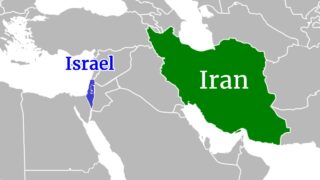By Stefan J. Bos, Chief International Correspondent Worthy News
TEHRAN/JERUSALEM (Worthy News) – Iranian officials say Israel has caused “deep alarm in Iran” by destroying all four Russian-made S-300 air defense systems protecting the Islamic Republic.
Israel destroyed one S-300 system in Iran in April and three more this past weekend, leaving Iran “exposed” without a defensive shield to intercept incoming missiles, according to Israeli sources familiar with the situation.
Military experts say the S-300 is one of the most potent defense systems in the world, capable of reaching a distance of up to 125 miles (200 kilometers).
U.S. broadcaster Fox News quoted an unnamed senior Israeli official as saying that “the majority of Iran’s air defense was taken out” in strikes that reportedly killed four Iranian soldiers.
A senior U.S. official confirmed that, among other key military targets, the Saturday airstrikes took out three S-300 systems over the weekend.
The strikes came after Iran fired a barrage of ballistic missiles at Israel at the beginning of the month.
Tehran has attempted to downplay the damage caused by the airstrikes. On Wednesday, local media cited Defense Minister Aziz Nasirzadeh as saying missile production has not been disrupted.
NOT SUCCESSFUL?
“The enemy has sought to hurt both our defensive and offensive systems but was not very successful because we had made arrangements and were in the know,” he claimed.
“The [production] knowledge is indigenous, so there is no disruption in the manufacturing process of missiles,” Nasirzadeh said.
He seemed to confirm that a defense system was damaged in the attack, saying it had been“replaced the day after.”
However, privately, Iranian officials said the strike on Iran’s air defenses caused “deep alarm” in the nation.
The Israeli attack rendered defenseless Khuzestan Province’s Abadan oil refinery, Bandar Imam Khomeini petrochemical complex, and an adjacent major port, as well as the Tange Bijar gas field in the Ilam Province.
The U.S. had urged Israel not to attack nuclear sites or gas and oil fields, though that option remains open if Iran attacks Israel again.
Israeli Prime Minister Benjamin Netanyahu said the Israeli strikes had destroyed “industrial factories of death.”
“We severely damaged Iran’s defense systems and its ability to export missiles,” Netanyahu stressed in a speech to the Knesset, Israel’s parliament. “These were not [basic tools] we were attacking.”
Copyright 1999-2026 Worthy News. This article was originally published on Worthy News and was reproduced with permission.
The following code is how the above article is generated with the Worthy Suite WordPress Plugin.
[worthy_plugins_news_story_body]This is how you display a story with an image.
Israel Strikes Leaves Iran ‘Defenseless, Naked,’ Officials Say

By Stefan J. Bos, Chief International Correspondent Worthy News
TEHRAN/JERUSALEM (Worthy News) – Iranian officials say Israel has caused “deep alarm in Iran” by destroying all four Russian-made S-300 air defense systems protecting the Islamic Republic.
Israel destroyed one S-300 system in Iran in April and three more this past weekend, leaving Iran “exposed” without a defensive shield to intercept incoming missiles, according to Israeli sources familiar with the situation.
Military experts say the S-300 is one of the most potent defense systems in the world, capable of reaching a distance of up to 125 miles (200 kilometers).
U.S. broadcaster Fox News quoted an unnamed senior Israeli official as saying that “the majority of Iran’s air defense was taken out” in strikes that reportedly killed four Iranian soldiers.
A senior U.S. official confirmed that, among other key military targets, the Saturday airstrikes took out three S-300 systems over the weekend.
The strikes came after Iran fired a barrage of ballistic missiles at Israel at the beginning of the month.
Tehran has attempted to downplay the damage caused by the airstrikes. On Wednesday, local media cited Defense Minister Aziz Nasirzadeh as saying missile production has not been disrupted.
NOT SUCCESSFUL?
“The enemy has sought to hurt both our defensive and offensive systems but was not very successful because we had made arrangements and were in the know,” he claimed.
“The [production] knowledge is indigenous, so there is no disruption in the manufacturing process of missiles,” Nasirzadeh said.
He seemed to confirm that a defense system was damaged in the attack, saying it had been“replaced the day after.”
However, privately, Iranian officials said the strike on Iran’s air defenses caused “deep alarm” in the nation.
The Israeli attack rendered defenseless Khuzestan Province’s Abadan oil refinery, Bandar Imam Khomeini petrochemical complex, and an adjacent major port, as well as the Tange Bijar gas field in the Ilam Province.
The U.S. had urged Israel not to attack nuclear sites or gas and oil fields, though that option remains open if Iran attacks Israel again.
Israeli Prime Minister Benjamin Netanyahu said the Israeli strikes had destroyed “industrial factories of death.”
“We severely damaged Iran’s defense systems and its ability to export missiles,” Netanyahu stressed in a speech to the Knesset, Israel’s parliament. “These were not [basic tools] we were attacking.”
Copyright 1999-2026 Worthy News. This article was originally published on Worthy News and was reproduced with permission.
[worthy_plugins_news_story_title]
<div style="text-align:right; padding:0px 0px 10px 15px; float:right; width:300px;"><img src="[worthy_plugins_news_story_image name=sm_medium]" alt="" /></div>[worthy_plugins_news_story_body]